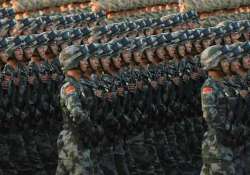With 7.6% budget hike, China becomes world's second largest defence spender
Beijing: China became world's second largest defence spender after a budget report to the national legislature annual session was shown on Saturday.According to a budget report, the government plans to raise the 2016 defence budget

Beijing: China became world's second largest defence spender after a budget report to the national legislature annual session was shown on Saturday.
According to a budget report, the government plans to raise the 2016 defence budget by 7.6 percent to 954 billion yuan (about $146 billion), Xinhua news agency reported.
The increase last year was 10.1 percent.
The fresh raise will make China the second largest defence spender.
China's military expenditure had seen a five-year run of double-digit increases between 2011 and 2015. The country saw the defence budget growing by 7.5 percent in 2010.
Friday's report did not offer further breakdown of the figure nor explain the rationale behind the abated growth, although some officials and military experts have pointed to slowing growth in the world's second largest economy.
General Chen Zhou linked the forecast-beating slowdown with China's "economic and social status quo" in an interview with Xinhua.
"A single-digit rise following years of double-digit growth is a prudent, moderate move," said Chen, adding that there are no "hidden" expenses in the country's military spending.
Faced with increasing economic headwinds with uncertainty clouding global recovery, China saw its economy expanding 6.9 percent year on year in 2015, the slowest in a quarter of a century, weighed down by a property market downturn, falling trade and weak factory activity.
The government put this year's growth target between 6.5 and 7 percent, compared with last year's "approximately 7 percent" goal.
The cut of 300,000 service people announced by Chinese President Xi Jinping in September 2015 might also have helped drive down the defence budget growth figure.
China will make its military more revolutionary, modern and better structured, strengthen in a coordinated way military preparedness on all fronts and for all scenarios and work meticulously to ensure combat readiness and border, coastal and air defence control, Premier Li Keqiang said in the government work report to the national legislature annual session.
Logistics and equipment development will be stepped up and the military's size and structure will undergo reforms, he said.
To modernise management and administration, the People's Liberation Army (PLA) inaugurated a General Command for the army, the PLA Rocket Force and the PLA Strategic Support Force in December. In February, it replaced seven military area commands with five PLA theatre commands.
"The PLA is in the key phase of deepening reforms," General Luo Yuan said.
"A moderate increase in the military budget is necessary," he said.
Though recent rises in defence budgets surpassed GDP growth, China's military expenditure in 2015 accounted for 1.33 percent of GDP, well below the world's average of 2.6 percent.
The per capita military spending is even less, representing only about 5.6 percent that of the US, 11 percent that of Britain and 25 percent that of Japan.